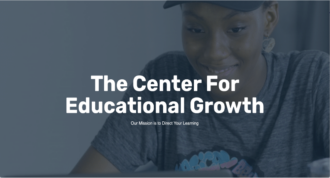ST. CROIX, Virgin Islands
Agricultural Field Trip & Cooperators Farm networking
The Center for Educational Growth (CFEG), an education-based nonprofit organization and hybrid school that offers online and in-person courses for students headquartered in the U.S. Virgin Islands, received a $50,000 Research and Education grant from the Southern SARE (SSARE) program to develop a virtual and in-person youth sustainable education agriculture program on St. Croix. As a good model for similar programs everywhere, the funding helped to advance their learning platforms for students in the community by launching programs that teach youth about agriculture and how to improve/sustain their environment & human welfare.
Sandra Cannon, the director of the CFEG, was the project’s principal investigator (PI). As a veteran career counselor with technical expertise and a network throughout the Virgin Islands Department of Education, Department of Agriculture, and the University of the Virgin Islands Research and Technology Park, Cannon and CFEG’s staff gave their students an integrated experience, a path into careers, and lessons from devoted business owners, professions, millennials, and local enterprises as well as economic development specialists.
Canon highlighted partners including Vanessa Forbes, the Southern program assistant at UVI, who was an excellent resource for the program, setting up workshops and connecting students with UVI's agriculture programs. Other partners and farms included Sansara Cannon, Shanika DeWindt, Lisa Petersen as well as Art Farm, Sejah Farm, Buddhoe Farm, Ridge to Reef Farm, 1878, LLC, CaneCuttaz, Inc., and Farmpod.
Aiming to expose young people to agriculture in the Virgin Islands, the program encourages them to become entrepreneurs in the field. The grant allowed them to purchase materials, take students on field trips to different farms, and incentivize students to create business plans for their own farms. The program also included virtual classes, summer programs, internships, and projects on sustainable farming. The Center for Educational Growth is planning to develop a community garden at their school.
CFEG’s principal intends to continue focusing on the future generations to address the lack of sustainable agriculture programs in the Virgin Islands community, which is a rural island with rich natural resources and land. The staff of CFEG worked in tandem with local farmers and professional business growers/suppliers to show students how to enter a career path in agriculture. The program specifically aimed to address the issue that students in the Virgin Islands lack connection to farming, despite living in a rural area with abundant farmland that is underutilized for environmental and agricultural benefits. Focused on student research of the farm systems of the Virgin Islands, the students learned to evaluate how these systems work, and practicums for building out these systems to create a sustainable farm system with professionals in the field of farming.
Cannon says that the SARE grant was a good start for them. It helped them create virtual classes learning farming techniques and processes, in-person summer programs, and internships where students learned what is done locally in farming practice and how to build their own farm or work for a farm. The students also were incentivized to work on projects that taught them how to maintain sustainable farming and build the system or develop farming systems in the future.
Internship at Buddhoe Farm & Business Implementation
According to the final report, the sustainable youth agriculture project peeked students’ interest in agriculture careers and research projects. The field trips with the hands-on experiences, helped cultivate a passion for agriculture among the young students. The learning and project outcomes also included ten farmers who reported changes in knowledge, attitudes, skills and/or awareness because of their participation and either changed or adopted a practice. Ultimately, this exposure would lead to increased enrollment in agricultural programs at the local university leading to the development of future sustainable farming practices in the Virgin Islands community. One participant, Isaiah Todman, applied to the University of the Virgin Islands to major in its’ Agronomy associate degree program.
The informative learning workshops on soil conservation, water management and biodiversity preservation raised awareness about sustainable farming practices and stimulated participants' desire to adopt eco-friendly planting methods. The project’s culmination of business planning provided participants with a vision for exploring a sustainable agricultural product with economic advantages. This aspect of the program focused on how students could contribute and be a part of the future growth and development of local farming communities. Discussions with participants centered around the positive impact of youth involvement in agriculture and job creation in the Virgin Islands. Additionally, the participants learned about job creation, income generation and the overall economic stability of the farming sector in the Virgin Islands.
Overall, the students who participated in this program walked away with the knowledge of starting and owning a farm business, a greater understanding of the diverse careers in agriculture and an appreciation of farmers and their contribution to the food production. The participants grew new perspectives on the business of farming and economic advantages as well as on-the job farm experience and a network of farmers who they can rely on for guidance.Moving forward after the SSARE grant concluded, Cannon says that the center intends to develop the community garden initiative to share herbs and seasonings with parents and community members, explore additional funding opportunities for expanding the agriculture education program, and continue to encourage more students to apply to the University of the Virgin Islands agriculture program.
The Center is planning to expand this project in the near future into a community farm. This would allow children and parents from the surrounding community to participate and share in the harvest of herbs and seasonings. Additionally, they are encouraging some of their students to pursue agriculture programs at UVI’s School of Agriculture with the hope that these students will return to teach others about agriculture and culture.
For more information on this Virtual and Live Youth Sustainable Educational Agriculture Program, visit https://projects.sare.org/proposals/793064/13167/ and watch the video below to learn more about the CFEG.
